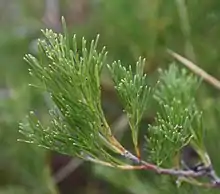Adenanthos meisneri
Adenanthos meisneri, commonly known as prostrate woollybush, is a species of shrub in the family Proteaceae. It is endemic to the south-west of Western Australia.[2]
| Adenanthos meisneri | |
|---|---|
.jpg.webp) | |
 | |
| Scientific classification | |
| Kingdom: | Plantae |
| Clade: | Tracheophytes |
| Clade: | Angiosperms |
| Clade: | Eudicots |
| Order: | Proteales |
| Family: | Proteaceae |
| Genus: | Adenanthos |
| Section: | Adenanthos sect. Adenanthos |
| Species: | A. meisneri |
| Binomial name | |
| Adenanthos meisneri | |
Description
It usually grows to 1 metre high and has leaves are up to 80 mm in length and about 7 mm wide. The flowers appear predominantly between September and December in the species' native range. These have a red-purple to pale violet perianth (up to 30 mm long) and glandular hairs. The style is up to 40 mm long.[2]
Etymology
The species was first formally described in 1845 by botanist Johann Lehmann in Plantae Preissianae[1] The type specimen was collected from the foot of the Darling Scarp by Ludwig Preiss in 1839.[1]
It is susceptible to Phytophthora cinnamomi dieback.[3]
References
- "Adenanthos meisneri Lehm. ex Meisn". Australian Plant Name Index (APNI), IBIS database. Centre for Plant Biodiversity Research, Australian Government.
- "Adenanthos meisneri Lehm. ex Meisn". Flora of Australia Online. Department of the Environment and Heritage, Australian Government.
- "Part 2, Appendix 4: The responses of native Australian plant species to Phytophthora cinnamomi" (PDF). Management of Phytophthora cinnamomi for Biodiversity Conservation in Australia. Department of the Environment and Heritage, Australian Government. 2006. Retrieved 12 February 2015.
External links
- "Adenanthos meisneri Lehm. ex Meisn". Flora of Australia Online. Department of the Environment and Heritage, Australian Government.
- "Adenanthos meisneri Lehm. ex Meisn". FloraBase. Western Australian Government Department of Biodiversity, Conservation and Attractions.
- "Adenanthos meisneri Lehm. ex Meisn". Australian Plant Name Index (APNI), IBIS database. Centre for Plant Biodiversity Research, Australian Government.
This article is issued from Wikipedia. The text is licensed under Creative Commons - Attribution - Sharealike. Additional terms may apply for the media files.